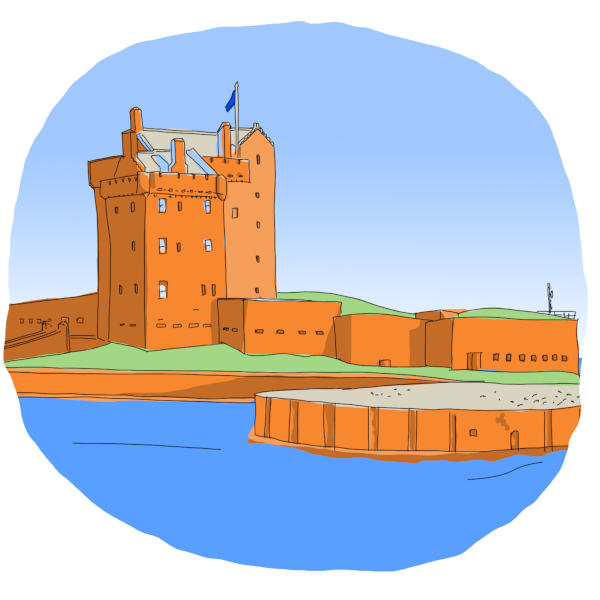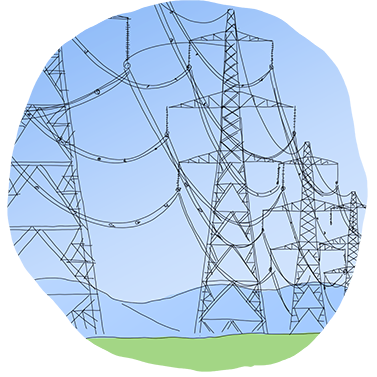Climate change is already affecting Dundee and the wider Tayside region. We are experiencing more frequent storms and flooding, as well as the first signs of water scarcity during dry periods. These extreme weather events can damage buildings, forests, and farmland, and disrupt health, transport, water, and energy systems.
To prepare for these challenges, Climate Ready Tayside brings together public, private, and community organisations to help our region adapt and thrive in a changing climate. Covering Angus, Dundee, and Perth & Kinross, the partnership supports the Scottish Government’s ambition to create regional adaptation partnerships across all of Scotland by 2029 — ensuring that every community is ready for the future.
What will change?

More Storms
Dundee will experience more frequent and high intensity storms. They can damage property, infrastructure, trees and pose a danger to life.

Food Availability
Climate change will have an impact on global food production. Although Scotland may be able to grow more food, this will not offset the impact global disruption has on us. The effects extreme climatic events will impact both supply and cost of food.

Natural environment
Climate change can affect the delicate balance of our ecosystems, damaging Scotland’s habitats and biodiversity beyond repair. Some Scottish species may struggle and could be lost completely. A damaged environment may not be able to sustain productive land or water supply.

Loss of Cultural Heritage
The changing climate is affecting our unique Scottish landscape and threatening our historic environment through coastal erosion, flooding and wetter, warmer conditions. The increased pace of climate change presents challenges to all those involved in the care, protection and promotion of the historic environment.

Infrastructure networks
Our energy, transport, water, and ICT networks support services that are vital to our health and well-being and economy. The effect of climate change on these infrastructure systems will be varied. They are likely to be impacted by an increase in disruptive events such as flooding, landslides, drought, and heatwaves. Infrastructure is closely linked and failure in any area can lead to widespread disruption.

More flooding
Flooding can have devastating impacts. With climate change altering rainfall patterns and bringing more heavy downpours, we expect the flood risk to increase further. This could impact our homes and infrastructure – with serious consequences for people, heritage, businesses and communities in Scotland.

Water Availability
As our climate warms and rainfall patterns change, there may be increased competition for water between households, agriculture, industry and the needs of the natural environment. Summer droughts may become more frequent and more severe causing problems for water quality and supply.

People’s Health
A warming climate will affect the spread of disease and other health issues. Climate change and associated extreme weather will disrupt the lives of individuals and communities, limiting access to vital services and impacting people’s physical and mental health.

Buildings
Climate change will have an impact on the design, construction, management and use of our buildings and surroundings. Whether retrofitting existing buildings or building new, it is likely that there will be issues with water floods and droughts, weather resistance and overheating.

Resilience
Climate change and the extreme weather it brings may disrupt transport, energy and communication networks in Scotland and around the world. This could impact on markets, affect supply chains and raise insurance costs.
Sea Level Rising
Sea level rise is already having an impact on parts of Scotland’s coast. This is set to worsen over the coming decades, which will bring more coastal flooding, erosion and coastline retreat – with consequences for coastal communities and infrastructure. Climate Central | Land projected to be below annual flood level in 2050

More Pests and Disease
As our climate changes, it will create new conditions that can allow existing pests and disease to spread and new threats to become established in Scotland. This may impact on the health of our people, animals, plants and ecosystems if risks are not properly managed.

Marine Environment
Marine life – from plankton to fish, mammals and seabirds – are already being affected by climate change as well as other pressures, particularly fishing. With increasing temperatures, there will be changes to species and their distributions. The changes will present both threats and opportunities to commercial fisheries and aquaculture.

Energy Supply and security
Climate change may influence Scotland’s ability to generate weather-dependent renewable energy. It can also impact power distribution and reduce transmission efficiency, due to damage by extreme weather events and temperature fluctuations. Changes in global energy markets can also affect energy supplies in Scotland and impact our overall energy security.

Soil Quality
We rely on soils to sustain biodiversity, support farming and forestry, regulate the water cycle and store carbon. Soils and vegetation may be altered by changes to rainfall patterns and increased temperatures - as well as the way we use the land.
